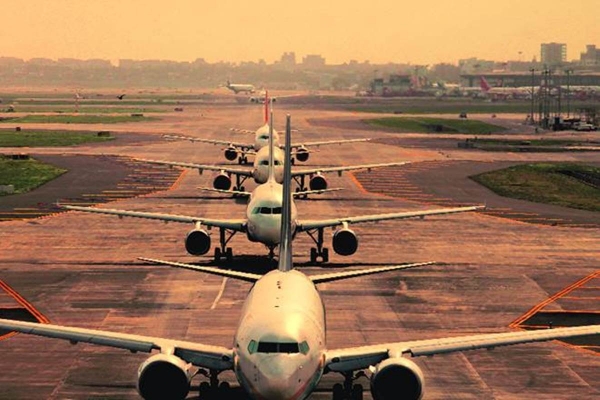Reliance plans to up aviation fuel stations by 50 per cent
After the COVID-19 pandemic, although travel restrictions were imposed elsewhere, India was largely unaffected until the end of March 2020, before the sharp esc
- by B2B Desk 2020-07-06 09:33:18
New Delhi: Mukesh Ambani’s Reliance Industries Ltd (RIL) plans to increase its network of aviation fuel stations by 50 percent as it seeks to gain a greater market share in the business currently dominated by oil retailers in the public sector. In its latest annual report, RIL said the double-digit growth seen for 52 consecutive months may have been stalled by the COVID-19 pandemic, but India remains one of the fastest-growing aviation markets in the world for the fifth consecutive year.
RIL, which operates the largest oil refining complex in one place in the world, plans to take advantage of this opportunity by increasing its presence at airports to refuel planes.
Passenger air traffic in India increased by 9 percent even in February after Indian airlines restored their full capacity which had been reduced after a major local airline closed in the first months of the 2019-2020 fiscal year ( April 2019 to March 2020) and added that there Mumbai airport has construction and maintenance issues.

After the COVID-19 pandemic, although travel restrictions were imposed elsewhere, India was largely unaffected until the end of March 2020, before the sharp escalation of global travel ban and closings will also affect the Indian aviation sector.
According to the annual report, "Due to the strength of the network, cost competitiveness, industry-leading technology, and best service standards, RIL has improved its share of the local market."
Reliance Airlines has the largest market share in 20 percent of operating airports.
"RIL is looking to increase its network to 45 locations from 30 at the end of the 2019-2020 fiscal year and is well-positioned to benefit from growth in the Indian aviation market," he said.
India currently has 256 aviation service stations, and the state-owned Indian Oil Corp owns 119 of them. Bharat Petroleum Corp Ltd (BPCL) owns the remaining 61% Hindustan Petroleum Corporation Ltd (HPCL) 44.
RIL is the largest private jet fuel retailer with 31 stations, according to the latest data from the Oil Ministry.
In comparison, the RIL automotive fuel retail network is very small. Of the 69,392 petrol pumps in the country, RIL operates 1,398. The IOC has the highest number of points of sale at 29,208, followed by HPCL with 16,557 and BPCL with 16,309 petrol pumps.
Russia's Rosneft-backed Nayara Energy is the largest private fuel retailer with 5,720 petrol pumps.
RIL said it registered 9.8 percent growth in diesel retail sales and 14.7 percent in petrol retail volume, compared to 1.5 percent and 6.3 percent for the industry, respectively.
During the fiscal year 2019-2020, RIL registered a growth of 10% in the average points of sale.
On bulk diesel, RIL said that it registered a volume growth of 10.8 percent and increased the market share to 8.8 percent, despite the contraction of anticipated demand and pressure on the margin.
It added that the volume of direct sales will be driven by the continued growth in the size of the railroads and the use of larger shares in government transport units.
Source: MSN
Also Read: Sukanya Samriddhi Yojana: Age norms relaxed for opening new accounts
POPULAR POSTS
Loan EMIs to Drop as RBI Slashes Repo Rate - Full MPC December 2025 Highlights
by Shan, 2025-12-05 11:49:44
Zoho Mail vs Gmail (2025): Which Email Platform Is Best for Businesses, Startups, and Students?
by Shan, 2025-10-09 12:17:26
PM Modi Launches GST Bachat Utsav: Lower Taxes, More Savings for Every Indian Household
by Shan, 2025-09-24 12:20:59
$100K H-1B Visa Fee Explained: Trump’s New Rule, Clarifications & Impact on Indian Tech Workers
by Shan, 2025-09-22 10:11:03
India-US Trade Deal Soon? Chief US Negotiator Arrives in Delhi as Talks Set to Begin Tomorrow
by Shan, 2025-09-15 11:54:28
Modi Meets Xi: Trump’s Tariffs, Strategic Autonomy, and the Future of Asia’s Power Balance
by Shan, 2025-09-03 06:40:06
Google Claims Gemini AI Uses Just ‘Five Drops of Water’ Per Prompt, Sparks Debate
by Shan, 2025-08-22 12:34:27
RECENTLY PUBLISHED

Pine Labs IPO 2025: Listing Date, Grey Market Premium, and Expert Outlook
- by Shan, 2025-11-05 09:57:07

The Agentic Revolution: Why Salesforce Is Betting Its Future on AI Agents
- by Shan, 2025-11-05 10:29:23

Top 10 Insurance Companies in India 2026: Life, Health, and General Insurance Leaders Explained
- by Shan, 2025-10-30 10:06:42

OpenAI Offers ChatGPT Go Free in India: What’s Behind This Big AI Giveaway?
- by Shan, 2025-10-28 12:19:11

Best Silver Investment Platforms for 2025: From CFDs to Digital Vaults Explained
- by Shan, 2025-10-23 12:22:46





 Subscribe now
Subscribe now 